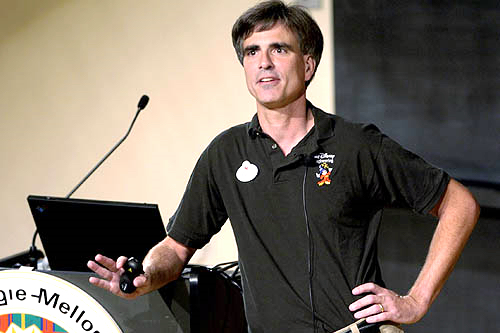Redefining the Word
|
I have benefitted a great deal from watching Randy Pausch's Last Lecture. I have viewed it many times. Each time I watch it, I have understood more and more of his lecture about life. In addition to some interesting parallel experiences that he and I share, one thing that impresses me is that he understands things that seem obvious to us from a different perspective. Read Pausch's explanation of what brick walls are.
Pausch's does the same with redefining experience. Listen to his definition. Pausch explanation is that "Experience is what you get when you didn't get what you wanted." He was able to articulate the meaning of events in order for him not to miss the learning experience. If we follow his insight, we will be able to see events in our lives from his perspective and not merely negate some bad experience as a negative happening or failure. Pausch makes a critical redefinition for the disappointments in life. Furthermore, Pausch is not the only person to observe that reality about experience. Oscar Wilde, the Irish writer and poet of the 19th century said, "Experience is simply the name we give our mistakes." The Dalai Lama, the Tibetan spiritual leader, said in our time, "There is a saying in Tibetan, 'Tragedy should be utilized as a source of strength.' No matter what sort of difficulties, how painful experience is, if we lose our hope, that's our real disaster." Experience is an interesting oxymoron. We do not wish to make mistakes in life. However, mistakes produce experience, which comes from mistakes. They are interrelated. Therefore, embrace the mistakes instead of shying away from them. We need to grasp them as we learn from them. Use mistakes to teach us as we journey down the yellow brick road of life.
The professor on the yellow brick road An interesting parallel between Pausch and me is that both of us have danced with death. I have written and spoken about dancing with death many times over the past decade. While I did not wish to dance with death, I would not delete either event from my list of life's experiences. Those experiences are in reality blessings, which I have fortunately understood and addressed. In addition, I will view future negative experiences in the manner that I view my dancing with death. Steve Jobs, who like Randy Pausch, also died from pancreatic cancer. Jobs' dance with death allowed him to understand life. He said, "Death is very likely the single best invention of Life." If we learn to redefine experience, we will have an entirely different perspective on life itself. Pausch, while dying of pancreatic cancer, kicks a couple of field goals and catches passes during a Pittsburgh Steelers practice. Now, there is a man who knows how to live in spite of the reality of death. However, the question remains for us. Do we understand living life in spite of our experiences? Pausch's definition is to the point, "Experience is what you get when you didn't get what you wanted."
Pausch kicking during the Steelers practice
Pausch practicing as a wide receiver
Visit the The Last Lecture page to read more about this topic.
Visit the Dancing with Death page to read more about this topic. 03/05/15 Follow @mountain_and_me |












